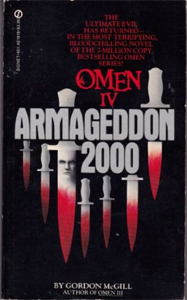After the “Omen” trilogy capper “The Final Conflict” (1981), the franchise sat in that middle ground between popular and unpopular that meant the story would continue in a cost-conscious way: via a novel rather than another film. Gordon McGill, writer of the novelization of the third film, wrote two sequels, starting with “Omen IV: Armageddon 2000” (1983).
A vastly grander and better sequel than the eventual fourth movie, “Omen IV: The Awakening” (1991), McGill’s book treats movie fans to the religious-horror flavor they like. But it does the typical “next generation” sequel thing (as with 1991 film) and isn’t big on surprises.
Returning to the formula, we have a story where one skeptic-turned-believer finds evidence that the late Damien Thorn was the Antichrist — and that perhaps his son is, too. This person passes on the knowledge to someone higher up the power chain, but is mysteriously killed. Rinse and repeat.

“Omen IV: Armageddon 2000” (1983)
Author: Gordon McGill
Series: “The Omen” No. 4
Genre: Horror
Setting: London, future 2000
With the main protagonist role handed off several times, and the villain acting off-page through godlike powers – and with side characters behaving like they might be the Antichrist’s disciples — “Armageddon” has an intriguingly indirect structure for a good-versus-evil novel.
Mysterious forces
Indeed, Damien’s son – now a teenager, as it is 2000 — is simply called “the boy,” and there is no central figure leading the forces of good. Survivors from the film trilogy do return, but they are now old. (This is the first “Omen” story to exist on a real-world timeline, as opposed to the sliding timeline of the films, wherein time passes for the characters yet the year of the events matches the film’s release date.)
The idea that a young man exists somewhere as the Second Coming of Christ is teased yet underplayed. I bet McGill saved this for the fifth book. If not, it’s bizarre to overlook this angle, as the risen Christ is so central to Damien’s strategies in part three.
Since readers know the ins and outs of an “Omen” tale, the key is to lavish on additional elements. McGill expands the saga’s horror playbook from religious to gory visuals. Notably, the boy does Norman Bates one better and worships the embalmed corpse of his parent. One murder sequence is quite visceral, although McGill passes on an opportunity to revel in further goriness.
The boy is under the care of Buher, now the head of the Thorn corporation, and there is some conflict between them. But it would’ve been nice if the author had further emphasized how this boy’s beliefs and actions are disturbing even to a soulless corporate overlord.
McGill nicely plays up Biblical prophecy in regard to the Israel-versus-Palestine conflict, using the round year 2000 as a tipping point. “Armageddon” is a typical story about nuclear fears – and a ground-floor preview of Y2K worries, in a way.

Looking ahead to 2000
For a novel about the future 2000 from the perspective of 1983, McGill’s imaginings are conservative – neither amusingly wrong nor brilliantly accurate. The highest technology is ground-penetrating radar and a beeper, both of which fit with the eventual real year of 2000.
McGill’s grasp of in-house “Omen” mythology isn’t as precise as it could be. The forces of good acquire six of the Megiddo daggers, and it’s odd that it’s unimportant to have a complete set of seven.
Ultimately, “Omen IV” is a professionally crafted, breezy read that allows serious fans of the trilogy to go on this horror ride again. It doesn’t expand the mythology nor totally embrace the non-visual medium as a way to maximize horrific images or concepts.
(The same can be said for the three novelizations, the original of which comes from screenwriter David Seltzer and sold more than 2 million copies. They are all decent but inconsequential companion pieces. Joseph Howard’s “Damien: Omen II” is the only one to go deeper than the film, as it makes Damien more of an active character, not worrying so much about the cinematic “mysterious” element.)
If I can find McGill’s rare “Omen V: The Abomination” (1985) at a good price, I’ll go for it. But I’m not champing at the bit to find out what happens next. Through four entries, I might not grasp the mythology of the daggers, but I certainly get the “Omen” formula.

